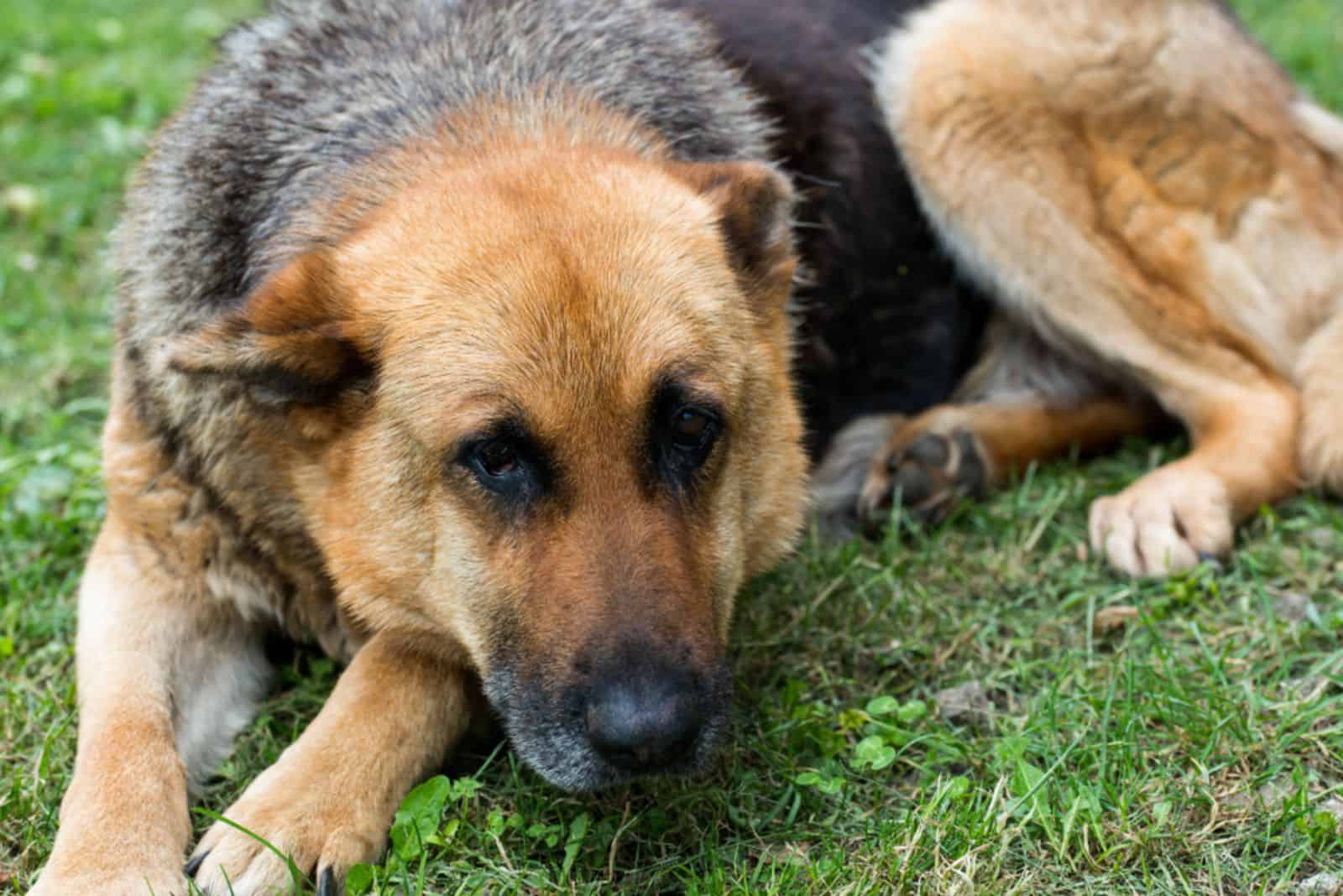Even though GSD puppies are considered to be one of the most fearless dogs in the world, the ‘‘Why Is my German Shepherd scared of everything’’ dilemma is not that uncommon in these pooches.
German Shepherd puppies are extremely sensitive dogs. They require attention at all times, as well as experienced, loyal, and committed owners. Once you miss filling in these boxes, it is highly likely that your GSD companion will respond in a negative way.
However, there are some common reasons why these pooches display fear that basically don’t have anything to do with the way you treat them.
Most of the time, these reasons are external – triggered by a misfortunate turn of events such as a new environment, an accident, trauma, or some sort of phobia. Let’s take a look!
Why Is My German Shepherd Scared Of Everything
Generally, all full-blooded GSD puppies are brave dogs that display no reluctance when it comes to protecting their home or their family. Even GSDs that are just several weeks of age crave to show their fearless character, and to fit the shoes of an adult watchdog.
Still, some puppies have a deeply-rooted trauma, triggered by certain doings such as yelling, screaming, fireworks, loud noises, etc. On the other hand, some puppies develop fear due to improper upbringing or socialization, or they are just naturally fearful.
In some rare cases, GSD dogs can experience fear as a result of some disease or pain. For instance, puppies with bloat or hip dysplasia are more likely to fear certain events, such as climbing stairs.
Truth be told, there are a plethora of reasons why GSD dogs display fear, and we’re about to cover some basics. Let’s begin!
1. History Of Bad Experience
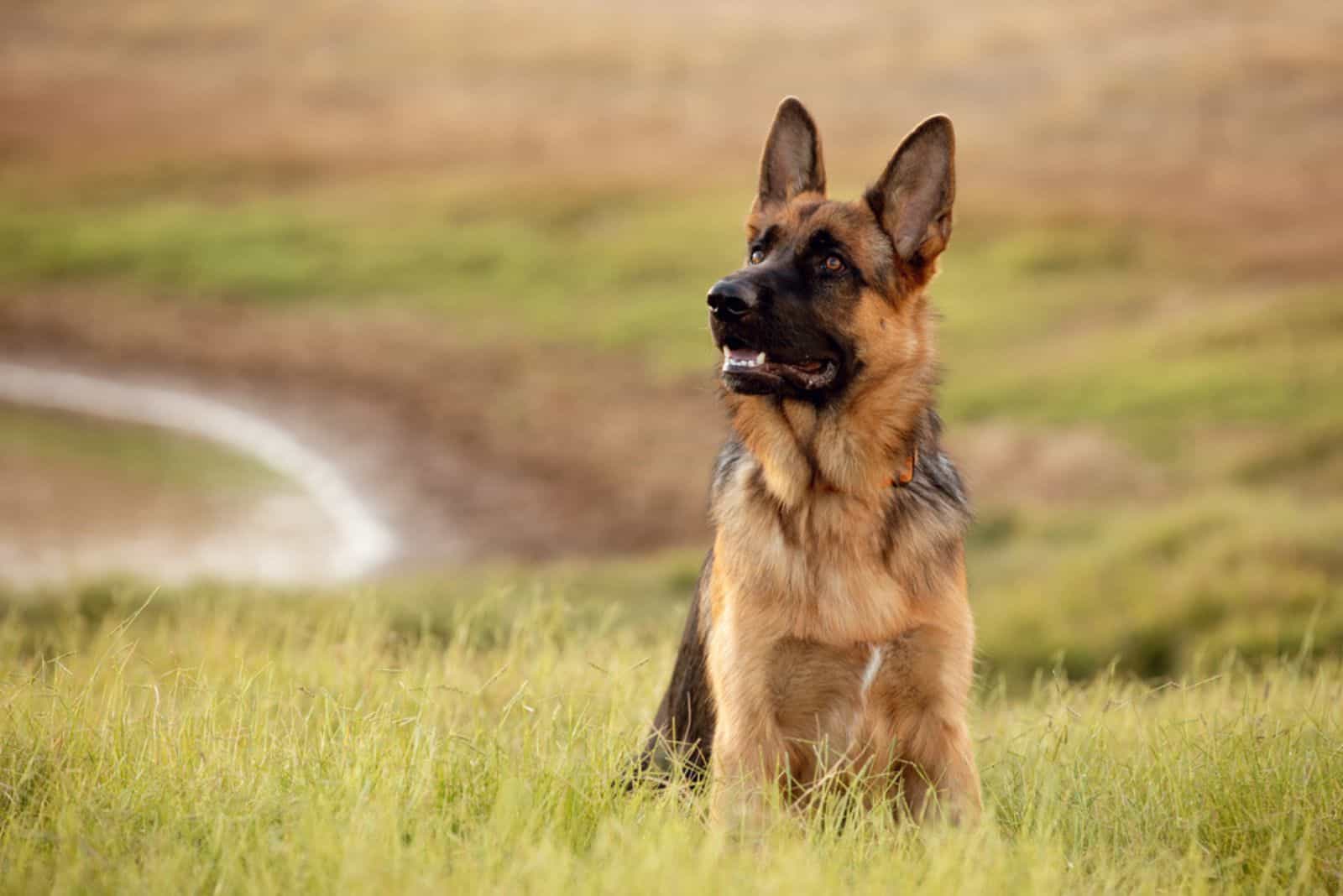
Most of the time, picking a GSD puppy from a reputable breeder is not enough. These canines require constant work and full engagement of their owners, especially in their young age.
That said, the reason why some GSDs are afraid of everything is deeply rooted in a bad experience they had with a previous owner.
The early puppyhood age is probably the most sensitive period in a GSDs life. This is the time when they learn socialization and their first puppy manners. GS dogs that are neglected during this period of time are most likely to display undesirable behavior in the future.
On the other hand, dogs that didn’t receive enough care and attention from their first owner in terms of socialization and positive reinforcement can display violent behavior as some sort of self-defense mechanism.
In other words, violence is deeply connected with their fear. Puppies that had a poor experience with their first owner are susceptible to fear. This includes improper parenting, yelling, punching, screaming, and keeping the dog outside.
2. Improper Parenting
The second possible answer on ‘‘Why is my German Shepherd scared of everything’’ is correlated with the aforementioned one. Namely, GSDs that were victims of improper parenting are most likely to fear everything in the future.
Improper parenting includes neglecting your puppies’ needs, skipping its daily exercise, lack of socialization, lack of positive reinforcement, using improper body language or a loud voice to ‘‘teach them manners,’’ and keeping them away from the family.
Even though GSDs are naturally watchdogs, these canines make one of the best family breeds in the world. They require proper maintenance in terms of physical and mental training, socialization, and bonding with their owner.
Puppies that lack these things on a daily basis are susceptible to sudden behavioral outbursts, separation anxiety, and even depression. All these things contribute to the development of their primal fear, which turns out to be their natural habitus.
3. Trauma
There is more than one trigger of trauma in dogs. Naturally, GSD puppies are not the shyest breed in the world as they are naturally outgoing, social, and confident.
However, a GS dog fear can either be triggered by a specific event or a phenomenon such as thunder, loud noise, fireworks, firecrackers, bath time during early age, etc.
Even though GSDs don’t require as frequent of baths as some other dog breeds, this specific event can turn out to be a real trauma if not delivered properly. You should get your GS puppy used to baths from an early age.
Taking things slow is the best way for them to realize that this is a normal part of their routine.
On the other hand, keeping your GSD in a silent environment during the first several weeks is probably the best idea. Puppies that don’t get enough time to adapt can be scared of new things, people, and even new voices.
Lastly, if you want your GSD pet to feel safe at all times, try keeping it away from loud events. No dog likes fireworks, firecrackers, or thunder. The best solution is to keep them inside the house during a storm, or on New Year’s eve.
4. Lack Of Socialization
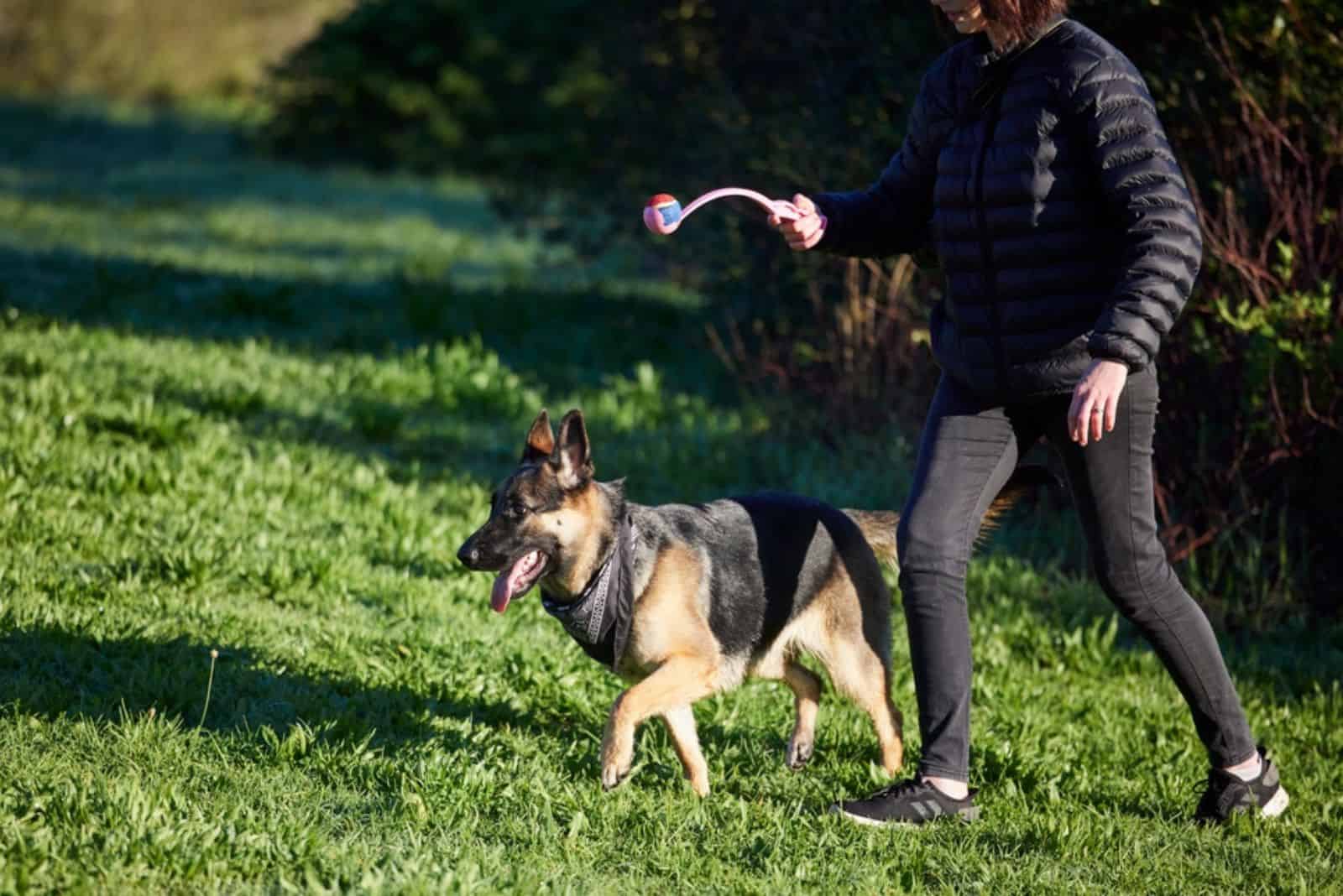
Lack of socialization in a GSD pet is a serious issue that requires immediate intervention. Unsocialized GS puppies can be very unsafe, even for their own family.
The most convenient time to start socializing your GS pet is early puppyhood as socializing an aggressive dog is not a walk in the park.
However, if you didn’t have the chance to subject your GS to early socialization, as you have just picked it up from a shelter, then the engagement of a professional dog trainer would be extremely helpful.
Despite being easily trainable and intelligent, GS puppies are not exactly the friendliest breed when unsocialized.
Most of the time, unsocialized dogs fear new people, and they act accordingly. Their aggression derives from their primal fear, which is why they will probably bark, hunch their back, tuck their tail, and growl at an unknown person they meet.
To avoid these things, start introducing your friends to the GS puppy during the first several weeks of its life. This way, your puppy will learn how to distinguish enemies from friends, as well as how to act in a bigger crowd.
The proper delivery of early socialization training has a positive correlation with a dog’s confidence in the future.
5. Adaptation Period
Never underestimate the power of slow adaptation, regardless of the breed. Every dog needs to be slowly adapted to a new situation or a new environment.
That said, one of the possible answers to the ‘‘Why is my German Shepherd scared of everything’’ dilemma is lack of a proper adaptation period.
Usually, puppies are picked up from a breeder at eight to ten weeks of age. Eight-week-old German Shepherds require at least a couple of weeks to adapt to a new home. These canines are vigilant and on alert by default, which is why they won’t feel comfortable in a new home right away. They may refuse to socialize at first as they can be afraid of unfamiliar faces and things.
A new dog should be slowly introduced to new family members, pets, and the new environment. After you have successfully passed the test of slow introduction, you can expect your puppy to start feeling more comfortable with all family members.
These canines are generally good with cats and other pets. On the other hand, GS dogs are extremely impeccable and clean as they learn how to poop and pee in a litter box without any problem. Still, you may want to give them some time to adapt.
6. Phobia
Some GS puppies may have a natural phobia. Aside from a natural fear of loud noises, some puppies can fear separation, vaccines, unknown people, children, TVs, certain objects, veterinarians, and stairs.
Additionally, getting a shock collar for your GSD puppy might sometimes be a bad solution as it may trigger a phobia.
Most of the time, there is no quite rational explanation as to why GS puppies fear one of these things – they simply do! However, there might be a possible solution to that! Namely, you can slowly start the desensitization process in a safe, nurturing environment.
That said, after identifying your dog’s primal fears, you can slowly start introducing new things to the puppy during short training sessions.
Furthermore, try encouraging your dog with positive reinforcement techniques. Try to praise them as much as you can as praising and petting can positively impact their fear.
7. Health Issues
Even though it is highly unlikely to happen, the answer to ‘‘Why is my German Shepherd scared of everything’’ may be found in a certain health issue.
For instance, GSDs that suffer from conditions, such as hip dysplasia, or bloat, can be afraid of certain events, such as climbing stairs (up or down), jumping, and being rubbed on their belly.
On the other hand, GS puppies that suffer from cataracts in their senior years may experience total blindness, which can trigger fear of the unknown. That said, blind puppies are usually afraid of new voices, surprises, and loud noise.
The dog’s behavior should be taken into consideration in these events as puppies with serious health conditions are usually unable to control their emotions. A fearful dog often equals an aggressive dog.
The best way to deal with fear in an unhealthy dog is to start from the root. That said, dogs should be subjected to veterinarian exams and treatments as soon as possible. Once you solve the primary problem, you will probably solve their fear triggered by a certain disease.
8. Separation Anxiety
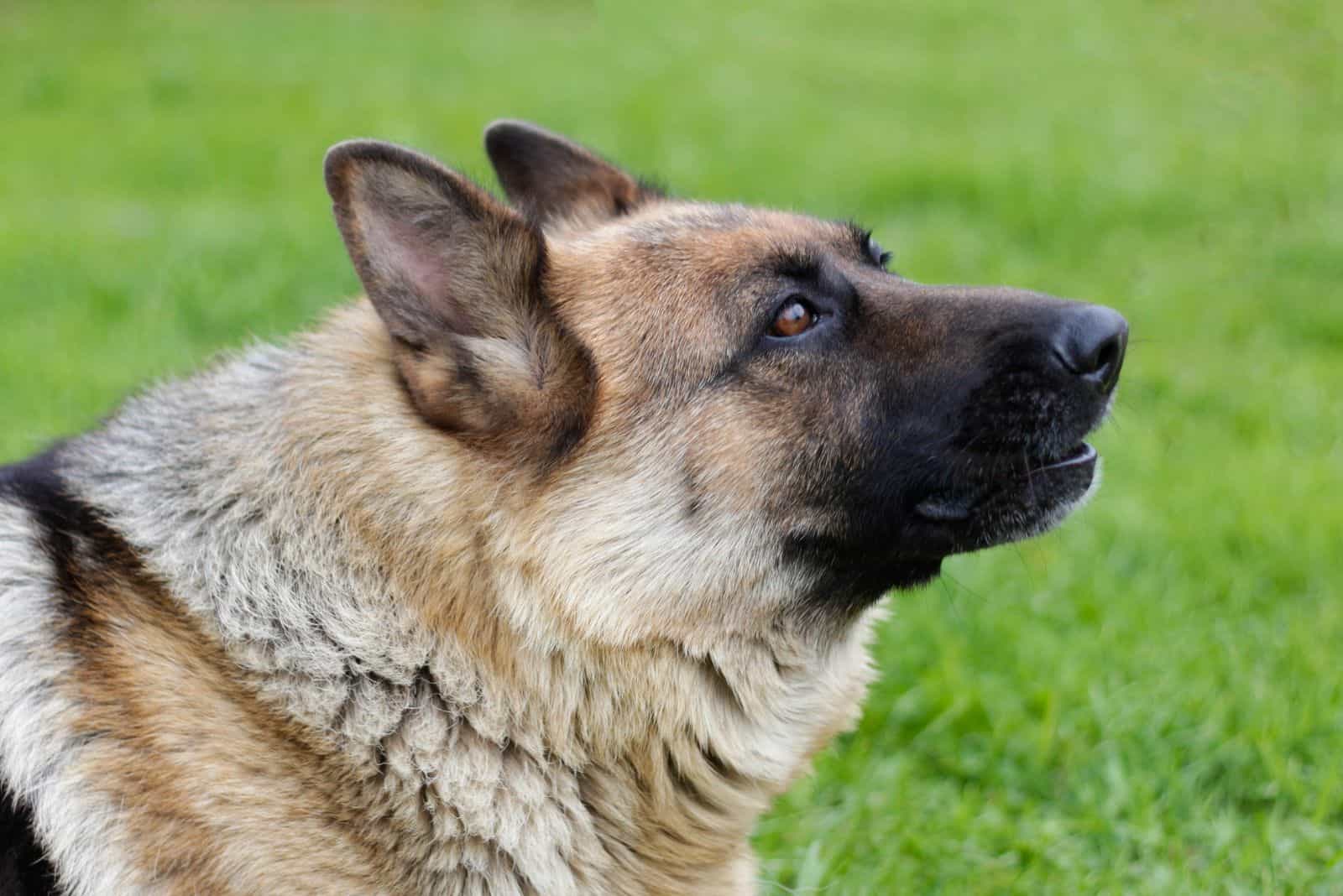
Dog owners usually don’t understand how severe separation anxiety can be in their pets. Naturally, all dogs bred for companionship crave love, affection, and all-time presence. This is no different with a GSD.
Separation anxiety is often the number one trigger of fear in dogs. That said, you should never leave your GS canine alone for more than several hours during the day. If, however, you have a busy schedule, make sure you train your GS to be alone first.
Dog TV shows, dog toys, and a fenced environment might come in handy in this regard.
Separation anxiety manifests in your GS dog by howling, pooping or peeing aside from their potty, excessive barking, aggression, escaping from their home, and even changing their daily routine.
Aside from being afraid of everything, puppies that suffer from severe separation anxiety may refuse to eat, drink, or even sleep.
However, the worst manifestation of separation anxiety in a dog is aggression. Dogs with anxiety use self-destructive and aggressive behavior as a fear response as they are emotionally insecure and hurt.
How To Recognize Fear In Your GSD
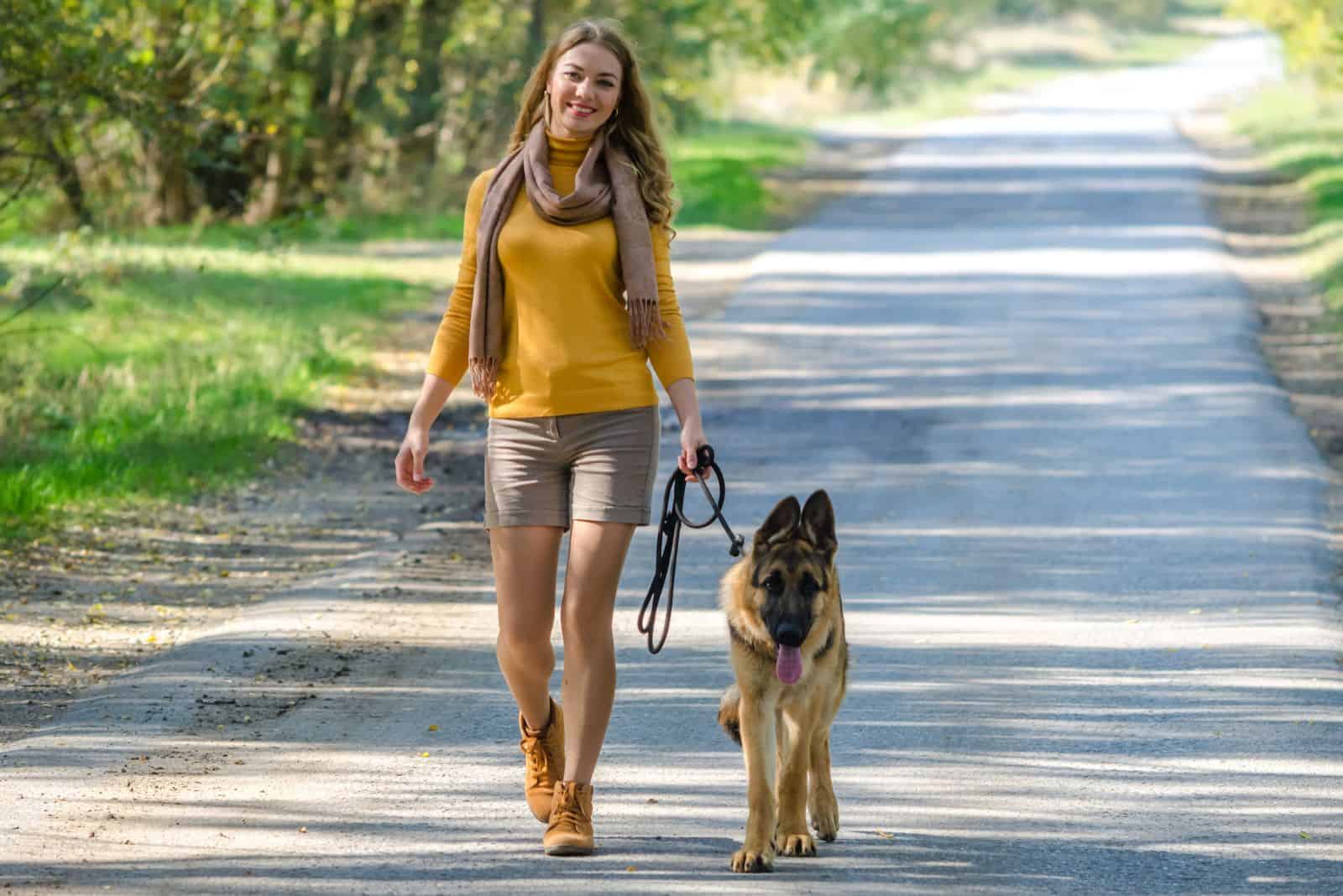
Even though GS puppies may be aggressive at times, this is a quite decent family dog that has little to zero behavioral outbursts in its adulthood.
Still, puppies that cope with fear may be aggressive a lot more, which is why it is important to recognize the root of their fear in the first place.
Some of the most common fear signs in a dog are: trembling, a hunched back, a tucked tail, ears back, barking, growling, licking their lips more than usual, and breathing heavily. Some GS puppies may even freeze in place, or move slowly as a result of fear.
Unfortunately, some dog owners don’t recognize these symptoms at first, which can lead to possible aggression.
That’s why the GS breed is usually not recommended for first-time dog owners, nor to those people who don’t quite know how to stand the ground of a pack leader.
In these kinds of situations, getting professional help from a dog trainer or a dog behaviorist may be a good idea. Taking your dog’s unusual behavior seriously is the first step towards a solution.
In a nutshell… any uncommon behavior in a dog is usually a sign of some sort of irregularity. If you notice that your puppy is starting to act weird – you may rethink some of your parenting methods.
Things You Can Do To Help Your GSD Overcome Its Fear
1. Early Socialization
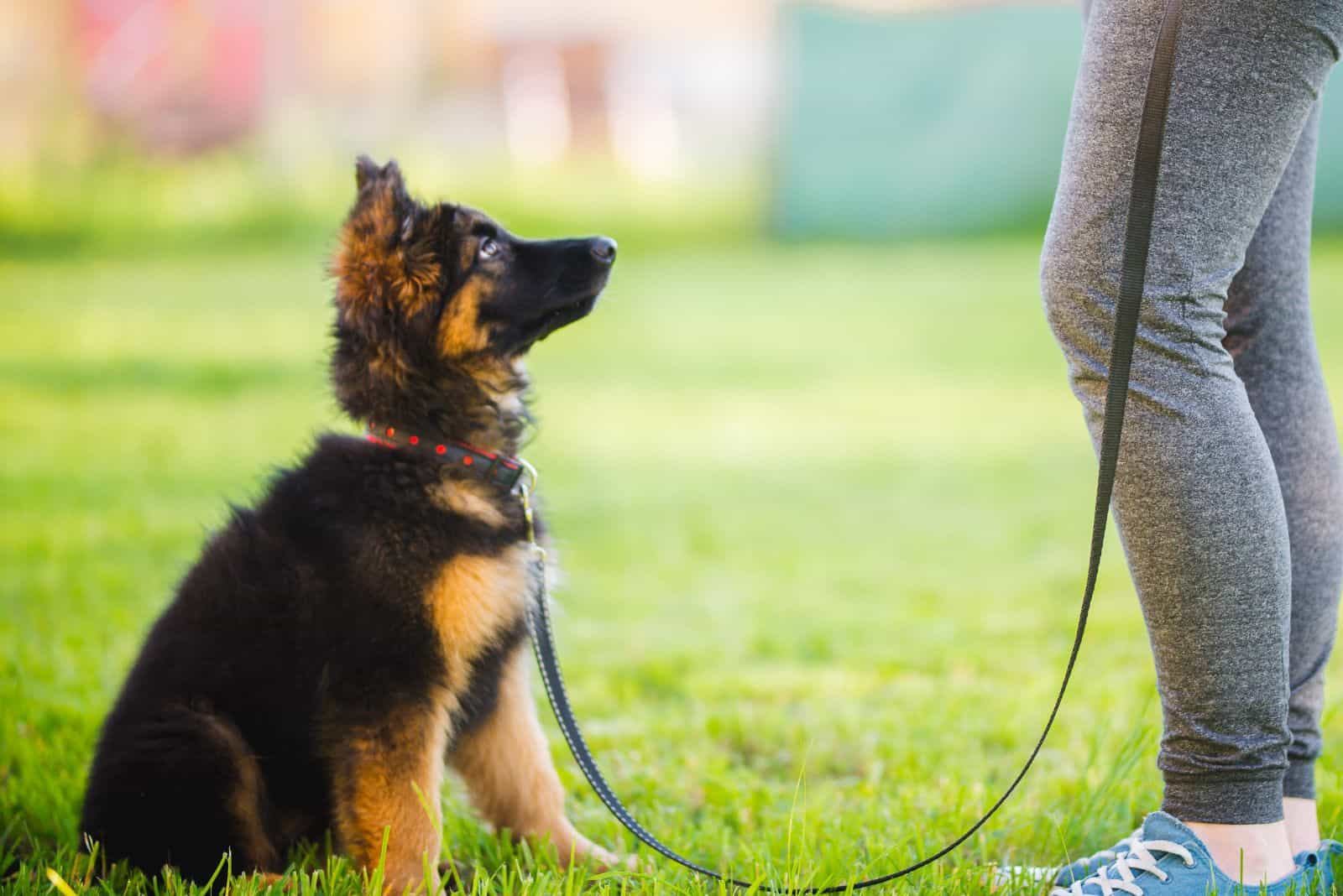
Both male and female German Shepherds require early socialization. The process of early socialization is one of the first things you should pay attention to when getting a GS puppy as a pet.
Even though this breed is characterized as intelligent, affectionate, and easy to train, GS puppies that don’t receive a proper amount of socialization in their early age may be harder to work with in the future.
On the other hand, early socialization may be a great stimulus as coming across new people, places, and things in their early puppyhood may reduce possible stress in the future.
That said, you should take your GS puppy to dog parks during its puppyhood in order to stimulate good outdoor behavior.
Furthermore, you should always start the socialization process with positive reinforcement techniques, such as praising, petting, or rewarding your dog with an occasional snack. This may reduce fearful behavior later on.
The puppyhood stage is known to be the fear period of your GS. That said, you should do as many activities as possible to stimulate your dog’s confidence. Eventually, you will get a well-mannered, confident dog that you will be able to walk off leash any time you want.
2. Getting Help From A Dog Trainer Or Behaviorist
If you are a true GS enthusiast, and at the same time, you lack experience in the field of dog parenting – there is no harm in seeking professional help from certified dog trainers and dog behaviorists.
Sometimes, training tools, such as dog training collars or dog toys just won’t do it as GS puppies are much more complex than that. Taking your puppy through gradual obedience classes will help you get a more confident dog in the future.
German Shepherd training should not be neglected, even for one bit. These amazing dogs simply crave stimulation as it helps them evolve mentally.
Mental stimulation not only helps them strengthen their natural intelligence, but it also helps them overcome their primal fears.
That said, certified dog trainers will know exactly how to get your dog there.
3. Positive Reinforcement
Positive reinforcement training is a great way to create a lifetime bond with your GS companion.
Training tools, such as interactive dog toys, or supplements, such as healthy snacks will help you stimulate your dog during training sessions, and they will also trigger positive behavior in the long run.
Furthermore, giving a nice, healthy portion of dog food as a reward right after the training session will set your puppy in a positive mood as these German beauties just love strict schedules.
Therefore, all of these positive reinforcement techniques will help your pet grow into a confident, strong, and affectionate dog that has little to zero fears.
On the other hand, puppies that don’t receive a proper amount of positive reinforcement during their growth may be a lot more aggressive in the future. Even though GSDs are naturally aggressive, they don’t respond well to yelling, screaming, or punching.
These methods will only cause a contra-effect, which is something you don’t want in your dog. Additionally, lack of positive reinforcement in your dog’s training may result in long-term fear towards anyone or anything.
4. Give It Enough Time To Adapt
Many dog owners make a basic mistake when getting a new dog – they don’t give their puppy enough time to adapt to the new environment. GS dogs are an extremely sensitive breed that needs appropriate time to adapt to their new family.
That said, these pooches will need at least a couple of weeks to get used to the new environment, including new family members, pets, and objects.
Therefore, you should make your home a nurturing place for your new puppy as a low-volume environment positively stimulates puppy behavior.
On the contrary, puppies that don’t get enough time to adapt may respond in aggression, self-destruction, or even fear. If you notice that your new GS puppy is hiding under the bed, or defecating in an unusual place – the reason may be an inadequate adaptation process.
Once they are adapted to their new home, GSDs are low-maintenance. This is one of the easiest dog breeds to potty train, as well as to obedience train. GS puppies love being stimulated, both mentally and physically, and they will do anything to please their owner.
However, you need to help them get there first.
5. Never Use Force
You should remember that GS puppies belong to the club of aggressive dog breeds. Therefore, these canines are most likely to display aggressive behavior as a result of improper parenting.
Using force during training sessions is never a good option with these German beauties.
This is a naturally dominant dog breed that loves to assert its dominance; hence, the aggression. However, some GS puppies may be permanently damaged in terms of their mental health by inadequate upbringing.
That said, puppies raised with constant yelling, hitting, and excessive screaming have a greater possibility of becoming afraid of everything. If you occasionally beat your dog to assert positive behavior – that will never be good!
On the contrary, you will trigger a whole plethora of bad emotions, including fear. Eventually, your GS puppy will fight back, which can result in serious aggression and rage.
Instead, always try using positive reinforcement methods in your dog’s training. Praising or petting your dog after a good training session will trigger a set of positive emotions, and that way, you will get a strong, outgoing, and sociable dog in the future.
In the end, remember one thing – taking a firm stand as the pack leader is not the same as being aggressive towards your pet.
FAQs
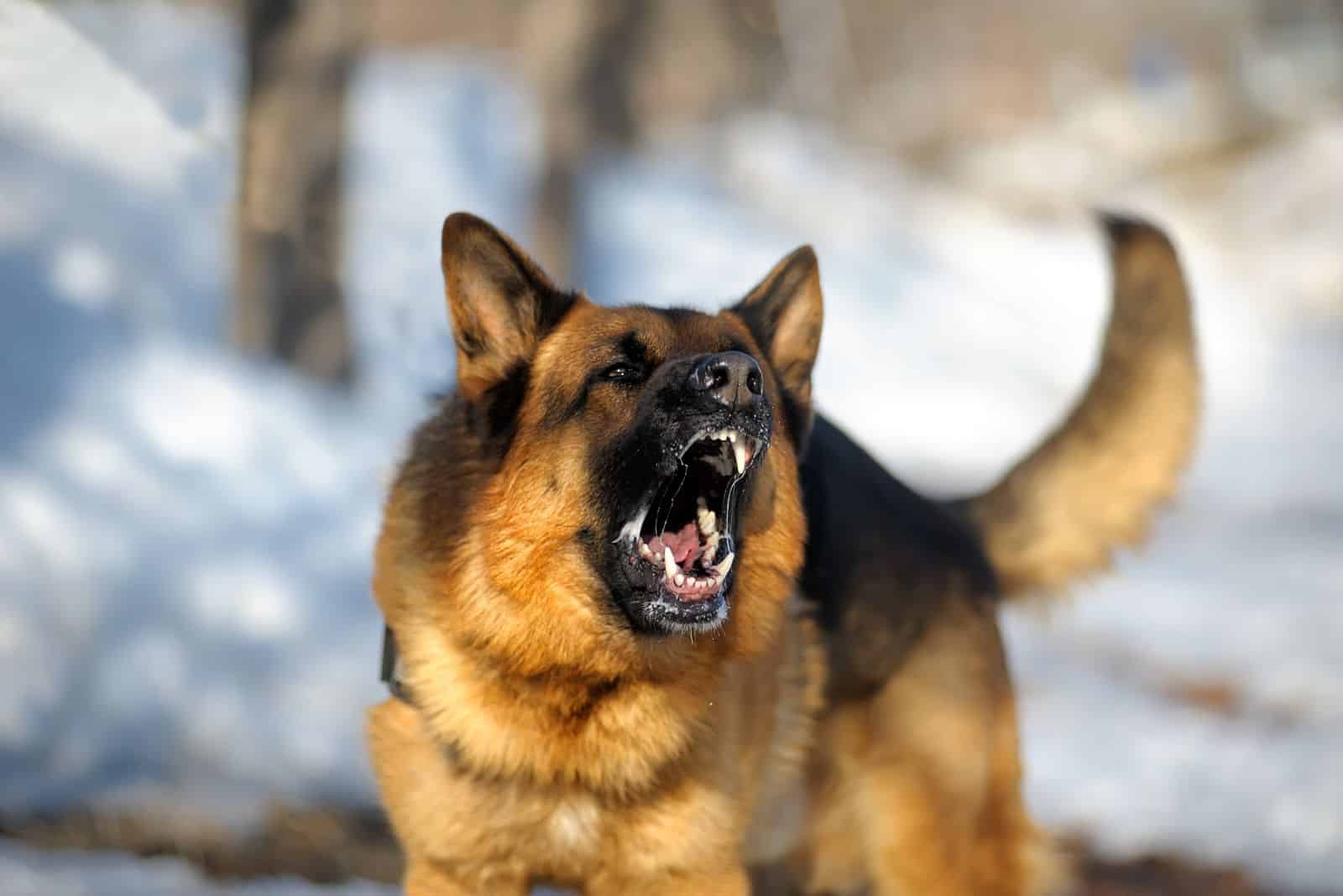
1. Why Does My German Shepherd Bark At Everything
Barking in dogs has more than just one reason. GS dogs generally bark when they want something, when they are afraid, or as a result of separation anxiety.
The ‘‘Why is my German Shepherd scared of everything’’ dilemma can be symptomized by excessive barking as dogs use their vocalization to defend themselves, as well as to scare away potential enemies.
GS dogs bark moderately, which means that there should be no red flag over regular dog barking. However, if you notice that your puppy is barking constantly and consistently, you should start looking for the root of the problem.
Alongside excessive barking, pay attention to other weird behavior in a dog. Some GS puppies yelp, lick their mouth more than usual, hide, or become too clingy when they are afraid.
2. What Is The Best Way To Help A German Shepherd That Is Scared?
There are several things you can do to help your GS overcome its fear. Firstly, you should start looking for the symptoms. Some puppies have an unusual way of expressing their fear.
For instance, some dogs may lay on you frequently, they may hide, or they may even follow you to the bathroom.
Furthermore, you should start looking for a trigger. Once you understand what makes your GS puppy afraid – you will be able to develop a strategy.
Generally, the best way to help your fearful dog overcome its fear is to implement the process of slow socialization and desensitization, as well as to use as much positive reinforcement as possible.
Furthermore, you can always use help from professional dog behaviorists, especially if you don’t have enough experience to resolve the problem on your own.
Lastly, you should avoid using harsh parenting methods such as yelling, screaming, or hitting your dog. That never turns out to be good for the GSD breed or any other breed for that matter.
3. Why Is My German Shepherd Afraid Of People?
Generally, GS puppies that don’t receive a proper amount of socialization training are afraid of new people. That said, you should subject your GSD to early socialization training as it is much easier to adapt a dog to new faces during puppyhood than during its adulthood.
Naturally, GS puppies belong to the club of the smartest dog breeds in the world, which makes the process of socialization easier. However, puppies that lack proper parenting may turn out to be aggressive, self-destructive, and unreliable around strangers.
That being said, you should never neglect your dog’s socialization training.
Conclusion
The ‘‘Why is my German Shepherd scared of everything’’ dilemma comes in various shapes and forms. Most of the time, recognizing fear in your dog will be easy as dogs have a natural, obvious way of displaying it.
However, some puppies have an unusual way of expressing their fear towards someone or something.
Some GS puppies become overly aggressive, while others become extremely lethargic. In this regard, getting professional help from an experienced dog trainer would not be the worst solution.
The most important thing is to recognize the roots of your dog’s fear. Once you realize what makes your dog afraid – half of your job is already done. So… good luck!
Read more: Why Does My Dog Scratch My Bed Sheets: 9 Explanations
